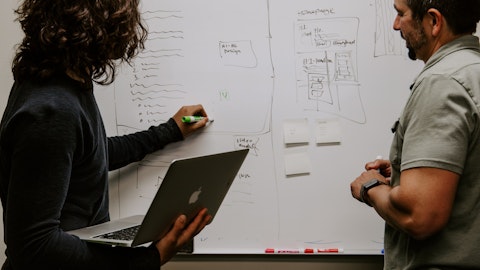Of course, Taobao is an open platform, and we stand ready to work with all partners and potential partners to provide the best services to our merchants. Thank you. Next question?
Operator: Thank you. Your next question comes from Gary Yu with Morgan Stanley. Please go ahead.
Gary Yu: Hi. Thank you, management and for the opportunity to ask questions. I have a question regarding the opening remarks about the target to increase return on invested capital to double digit. Can management share more about what kind of targets or how achievable this target in the next couple of years, specifically regarding these non-core business turning [ph] profitable. Any specific business unit that we think we can turn profitable within a certain period of time. Thank you.
Trudy Dai: Okay. Gary, thank you for your question. I will take this question. Yes, as Joe mentioned, actually, we are looking very closely into our ROIC. And we do set a target that we want to increase the ROIC to double digit in the next few years. There is a few ways we will take to achieve that target. In all our businesses, if you like, actually, as Eddie mentioned, we do have core and non-core business. And in addition, we will also have many of the investments sitting in our equity sort of like investments or even investing associates. So, for all of those investments, we are also a resource that we can use to – as part of the resource that we can utilize to enhance our ROIC. With respect to the core businesses, as Eddie explained, actually, we will need to invest in innovation and growth.
So, for all these core businesses, the growth and the future profitability will help certainly generating more earnings, which will contribute to increase of ROIC. And with respect to the non-core business and also the investments in our balance sheet that are no longer strategic or core to us, I think on one hand, as Eddie mentioned, we would need those businesses to become profitable as early as possible. And also for some of the investments, we were also looking to the opportunity to monetize, which will give us cash and eventually, we can utilize the cash to give the return to the shareholders. So, that will also help to increase our ROIC. So, thank you. Next question.
Operator: Thank you. Your next question comes from Alex Yao with JPMorgan. Please go ahead.
Alex Yao: Good evening and thank you for taking my questions. I have a question regarding the core business group. So, as you guys discussed in the prepared remarks, you decided not to proceed with a full spinoff of the cloud business. Is the withdraw of the spinoff and IPO a central decision for a fair market, if market condition change or the financial progress [ph], would you reconsider this decision? And then related to the operation, I think you guys decided to develop a tenable growth model for the cloud business. Given AI shifts restriction from the U.S., can you talk about your thoughts on how this sustainable growth model will be? Thank you very much.
Joe Tsai: Okay. Alex, this is a two-part question. So, I will answer the first part and Eddie will answer the second part. About our announcement did not proceed with the full spinoff. For us, this is – when we announced the full spin-off, we were looking at a way to sort of a financial engineering way to show the value of the business. And that was when the business was operating in circumstances that we thought were predictable with our ability to project the business and communicate to investors and provide a level of transparency to investors who will independently hold the shares of the Cloud Intelligence Group. But the circumstances have changed. And right now, rather than focus on financial engineering, we rather focus on figuring out how to grow the cloud business.
A big part of that is for us to – for the group to provide cash to make investments because the – in the AI driven world to develop a full-blown business based on a very networked and highly scaled infrastructure requires investment. So, we would rather show investors through the – our operations of the cloud business rather than spinning it off. And hopefully, we can enhance value to shareholders as we deliver future growth revenues and profits in the future. As far as the sustainable business model, I will let Eddie to answer that question.
Eddie Wu: Thank you. Well, the question you have asked really is a critical one. There have been many changes in the situation in the market. But I will come at this in two parts. In terms of business model, the CPU centered traditional cloud computing business is one where we built up a strong portfolio over the last 14 years. In this part of the business going forward, as we said, we are going to place our focus on public cloud because we think public cloud is where we can achieve very strong network effects and scale effects and thereby provide very good value for money to our customers. The second part of the business going forward into the future is GPU-based AI computing. And obviously, there have been some major changes in the external environment, policy wise and otherwise that will bring about important changes in the China market.





